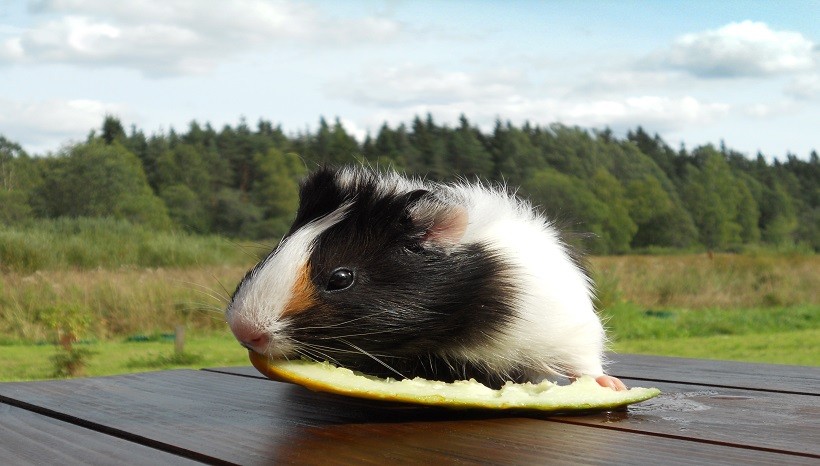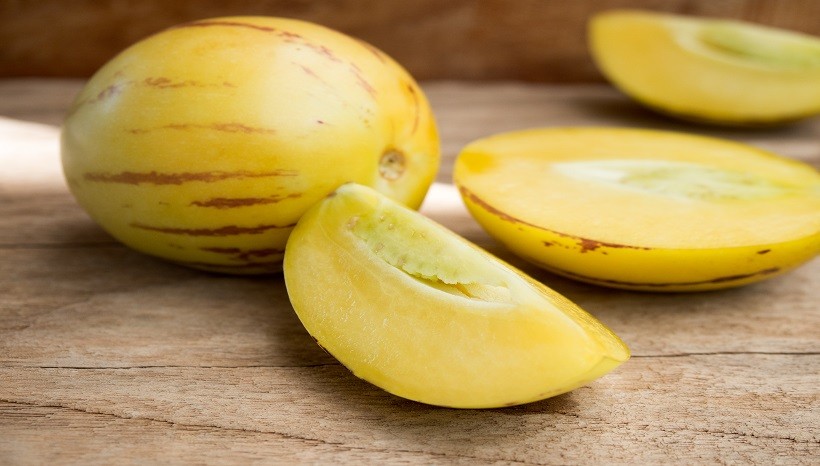Yes, guinea pigs can eat melons. Melons are a fascinating treat for many guinea pigs and cavies out there. It is safe to offer small amounts of fresh and sweet melons to guinea pigs, 1-2 times a week.
Melons are healthy for their nutritional diet. They make the guinea pigs stay hydrated in hot weather. Also, melons are a great source of essential vitamins such as Vitamin C and phosphorus.
Moreover, guinea pigs love to eat melon rinds and skin. Always offer a fresh and seed-free melon to your guinea pigs. Wash them once to remove any bacteria.
Concerning health, do not exceed the recommended quantity of melon because it will lead to serious health issues like obesity, excessive weight, tooth decay, diarrhea, etc.
Nutritional Facts of Melon
Melon is the most watery fruit, which contains a high percentage of water (91%) in it with almost no value of fats and proteins. It lacks the basic nutrition needed for the body of guinea pigs; hence melons are safe up to a certain extent.
Let’s understand the nutrition facts of melon:
Can You Give Guinea Pigs Melon Rinds?

Often yes! It is safe to give your guinea pig melon rinds along with the flesh and skin as it contains more profound sugar than the melon itself.
Concerning the good health of guinea pigs, always offer them a smaller portion of fresh melon rinds.
Some melon rinds like the fruit of Cantaloupe have a thick and rough rind surface, which contains a great number of fibers. As fibers do not suit the tummy of guinea pigs, so avoid giving them unnecessary melon rinds.
Can Guinea Pigs Eat Honeydew Melon?
Yes, guinea pigs can eat honeydew melon. Guinea pigs and cavies both have a sweet tooth for such treats that is why they adore the sweetness of the honeydew melon.
Cavies are most likely to enjoy honeydew melon, so you can offer them often. Honeydew melon keeps the cavies moist on warm sunny days as it contains an extra-large amount of water content.
Honeydew melon is high in sugars, so remember to give your cavies a moderate amount.
Give your guinea pigs small pieces of green pale honeydew flesh. Before offering one to them, make sure the honeydew is properly washed.
They also enjoy having honeydew rinds but they don’t like melon seeds; as seeds are dangerous and result in obesity.
Can Guinea Pigs Eat Cantaloupe Melon?
Yes, guinea pigs can have cantaloupe melon. You can offer your pig a small ratio of cantaloupes twice a week, but not more than that.
Guinea pigs need a large water intake all day long. Cantaloupe can help boost their energy, as it contains a great value of vitamin C that is beneficial to their health.
It is not wise to add cantaloupe melon to the daily diet of your pigs. As the sugar content is high in cantaloupe, it can cause serious health issues to your pigs like heaviness or making them diabetic.
For the good health of your pigs, a small amount of cantaloupe fulfills their calcium. But, be careful with the quantity of the cantaloupe as it is high in phosphorus that can lead to kidney stones.
Can Guinea Pigs Eat Pepino Melon?

Not all! A few guinea pigs like to feed upon this pale green fruit, called Pepino. Many guinea pigs mostly don’t like to have them in their diet. Therefore, the Pepino fruit is not the favorite fruit of all guinea pigs.
However, the Pepino melon has a taste that is similar to three different fruits that are likely to be eaten by guinea pigs occasionally. Pepino bears a sweet taste like rockmelon, honeydew, and cucumbers.
That’s why guinea pigs that have already tasted Pepino before are the ones that are prone to have it as a treat. Others might not desire it.
Like other melons, Pepino should be offered in small pieces. An occasional small quantity of Pepino could help piggies maintain their water level, and low sugar intake assists in balancing the body’s nutrients.
Is Melon Safe For Guinea Pigs?
Yes, melon is a safe treat for guinea pigs. Guinea pigs like the taste of the melon. They have a sweet tooth for all types of melons, cucumbers, and other fruits.
However, it is important to offer a little amount of melon fruit to your guinea pig. Melons are harmless until they are properly rinsed before being offered to eat.
Moreover, the high sugar content in a melon can impose a great risk factor to the guinea pigs causing them several digestive disorders. So, don’t put them in the daily diet of your guinea pigs.
Always remove the seeds and give small chunks of flesh and skin of melon to your piggy.
Can Guinea Pigs Eat Melon Every Day?
No, it is not recommended to let your pigs eat melon back to back.
Melons are not fed as a regular meal to guinea pigs. All fruits and vegetables are good for their health if they are given in a fair proportion throughout the month.
However, a more unique option is to serve your pigs with a variety of edible fruits and vegetables like red or green pepper, tomatoes, broccoli, zucchini, carrots, and sweet potatoes.
On the safe side, only feed the whiter soft part (inside flesh) of the melon rinds occasionally 1-2 times per week, and look out to your pig forward for signs of diarrhea.
Can Guinea Pigs Eat Watermelon?
Naturally, guinea pigs love to eat watermelon. You can give small cubes of watermelon to your guinea pig and it will eat it without leaving a scrap.
Watermelon is a good source of reducing dehydration in your guinea pig. There is no harm in offering watermelon to them thrice a week. You can see how much they enjoy this treat.
It is crucial to know that all fruits have a bulk of sugars and fibers, carrying in their flesh. Daily or excessive intake of watermelon can be unhealthy for guinea pigs as they will gain excess weight that makes them less active and obese.
Also, they might face the problem of tooth decay. Alternatively, you can offer your guinea pigs watermelon rinds once or twice a week, with a few small chunks of green melon flesh.
It is preferable to give a fully ripe watermelon to your guinea pigs. Most importantly, do not forget to wash off the seeds of the watermelon to prevent the risk of choking your guinea pigs.
Conclusion
It is safe to allow your guinea pigs to munch over the small slices of melon thrice a weekend. If proper precautions are taken, there is no harm in feeding your guinea pigs occasionally with melons. Melons have both pros and cons. A limited amount if offered can be easy to digest for pigs. It will keep them hydrated and healthy while they enjoy their favorite treat.
If you want to learn more about pets visit us at petshoods
{ "@context": "https://schema.org", "@type": "Article", "mainEntityOfPage": { "@type": "WebPage", "@id": "https://petshoods.com/can-guinea-pigs-eat-melon/" }, "headline": "Can Guinea Pigs Eat Melon? | Cantaloupe, Honeydew, And Watermelon", "description": "Yes, Guinea Pigs Can Love To Eat Melons As A Treat. It Helps In Keeping Them Hydrated. Cantaloupe, Honeydew, And Watermelon Are Also Great For Guinea Pigs With Lots Of Health Benefits.", "image": "https://petshoods.com/wp-content/uploads/2021/08/Can-Guinea-Pigs-Eat-Melon-768x436.jpg", "author": { "@type": "Person", "name": "Jeremy" }, "publisher": { "@type": "Organization", "name": "Petshoods", "logo": { "@type": "ImageObject", "url": "https://petshoods.com/wp-content/uploads/2019/02/13925402_1502331219793083_1620090286454245017_n.jpg" } }, "datePublished": "2021-09-04", "dateModified": "2021-09-18" }